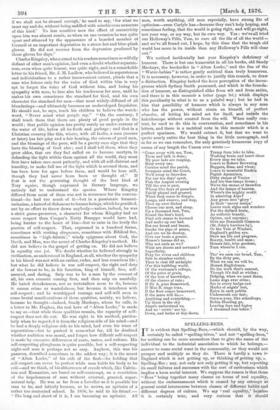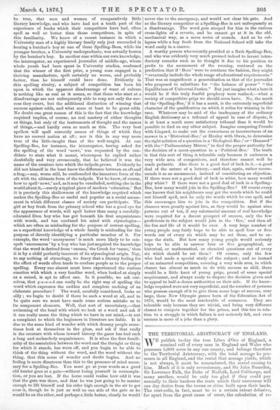SPELLING-BEES.
TT is evident that Spelling-Bees,—which should, by the way, 1. certainly be called " spelling-hives," and not "spelling-bees," for nothing can be more anomalous than to give the name of the individual to the industrial association to which he belongs,— answer to some social want in the community, or they would not prosper and multiply as they do. There is hardly a town in England which is not getting up, or thinking of getting up, i. Spelling-Bee ; nay, not only not only getting it up, but reporting its small failures and successes with the sort of enthusiasm which implies a keen social interest. We suppose the reason is that these " Bees " bring together many classes on terms of real equality, without the embarrassment which is caused by any attempt at general social intercourse between classes of different habits and different degrees of culture. We say ' real equality,' beeause it is certainly true, and very curious that it should be true, that men and women of comparatively little literary knowledge, and who have had not a tenth part of the experience of books which their competitors have had, often spell as well or better than those competitors, in spite of this familiarity. We know of a recent instance in which a University man of a highly literary family only just succeeded in beating a butcher's boy at one of these Spelling-Bees, while his younger brother, a University undergraduate, was actually beaten by the butcher's boy. In another case within our own knowledge, the interrogator, an experienced journalist of middle-age, whose whole youth had been spent in University studies, confessed that the winner of the first prize, a young man engaged in a thriving manufacture, spelt certainly no worse, and probably better, than he himself could have done. Evidently in this spelling rivalry, a subject of competition has been hit upon in which the apparent disadvantage of want of culture is nothing like as real as it seems, so that those who start at a disadvantage are not unfrequently able to reap not only the suc- cess they court, but the additional distinction of winning that success against odds, and what seem at least to be great odds. No doubt one great reason of this is the fact that the knowledge required implies, of course, no real mastery of either thoughts or things, but only of the instruments of thought and the names of things,—and hardly even so much as this. The very best spellers will spell correctly names of things of which they have no correct notion at all ; nor is this in any way more true of the little-taught than of the well-taught. At one Spelling-Bee, for instance, the interrogator, having asked for the spelling of the word 'newt,' was requested by the can- didate to state what it meant, whereupon be replied rather doubtfully and very erroneously, that he believed it was the name of the creature into which the tadpole grows. Evidently he did not himself in the least know the difference between an eft and a frog,—nay, worse still, he confounded the immature form of the aft with the ultimate form of the tadpole. Yet he knew, of course, how to spell' newt,' and, as it may be concluded, nothing else in the world about it,—surely a typical piece of modern education.' But it is precisely this shallowness of the knowledge required which snakes the Spelling-Bee so useful and popular as a social amuse- ment in which different classes of society can participate. The
g irl or boy fresh from the primary school who has a good eye for the appearance of words, will spell better than many a carefully- .educated Eton boy who has got beneath his first acquaintance with words, and has confused his mind with etymologies— which are often as misleading for the purpose of correct spelling, as a superficial knowledge of a whole family is misleading for the purpose of directly identifying a particular member of it. For example, the word anonymous' is much more likely to be mis- spelt anonomous ' by a boy who has just acquired the knowledge that the word is derived from onoma,' the Greek for 'name,' than it is by a child perfectly innocent of its etymological origin. Nay, to say nothing of etymology, we fancy that a literary feeling for the effect of words often tends to confuse people ap to the proper spelling. Every one almost must have experienced the curious emotion with which a very familiar word, when looked at simply -as a sound, is apt to affect one. Is it possible, we ask our- selves, that q-u-a-s-h can really be the right way of spelling the word which expresses the sudden and complete undoing of an -elaborate procedure ? The word, carefully considered, looks so -silly ; we begin to doubt if there be such a word at all, and to be quite sure we must have made some serious mistake as to its component elements. Well, that sort of uncertainty,—that -swimming of the head with which we look at a word and ask if it can really mean the thing which we have in our mind,—is not a complaint to which the beginners in literature are liable. It is due to the same kind of wonder with which dreamy people some- times look at themselves in the glass, and ask if that really -is the creature with whose inward history the gazer has had each a long and melancholy acquaintance. It is when the first famili- arity of the association between the word and the thought or thing -for which it stands, has worn off, and you begin to be able to -think of the thing without the word, and the word without the thing, that this sense of wonder and doubt begins. And no -feeling is more disastrous than this to the presence of mind neces- sary for a Spelling-Bee. You must go at your words as a good old hunter goes at a gate—without losing yourself in contempla- tion, or you are lost. H the horse could realise how odd it was that the gate was there, and that he was just going to be maniac enough to lift himself and his rider high enough in the air to get over it, though he is just as well on one side of the gate as he would be on the other, and perhaps a little better, clearly he would
never rise to the emergency, and would not clear his gate. And so the literary competitor at a Spelling-Bee is not unfrequently at a disadvantage. The word gets steeped for him in the curious cross-lights of a reverie, and he cannot go at it in the old, mechanical way, as a mere series of sounds. And so he col- lapses while a boy fresh from the National School will take the word easily in a canter.
A worthy person who recently presided at a Bath Spelling-Bee, and who was evidently very much pressed indeed to invent intro- ductory remarks such as he thought it due to his position to prefix to the amusement of the evening, ventured on the prediction that if Bees' were to continue the fashion, they might " eventually include the whole range of educational requirements." That was as magnificent a generalisation as that of the journalist who proposed to substitute for "the balance of power" "the Equilibrium of Universal Justice." But just imagine what a bore it would be if this truly fearful prophecy were realised,—what a society of competitive prigs we should soon have. No, the merit of the Spelling-Bee,' if it has a merit, is the extremely superficial character of the qualification on which it relies for winning in the race. Whatever may be said of the inadequacy of the ordinary English dictionary as a tribunal of appeal in case of dispute, it is at least a much more satisfactory tribunal than it would be possible to find on any other subject. Imagine comparing Fronde with Lingard, to make out the correctness or incorrectness of an answer in a ' Historical-Bee;' or Huxley with Owen, to determine the right solution of a question in a Biological-Bee ;' or " Hansard " with the " Parliamentary Mirror," to find the proper authority for the decision of a moot-question in a Political-Bee.' The truth is that this sort of thing is tolerable only because it embraces a very wide area of competitors, and therefore cannot well be made pedantic. Also there is a good deal of luck in it,—a good deal of the nature of a lottery,—and that, again, rather recom- mends it as an amusement, instead of constituting an objection. If there were not a good deal of luck in whist, how many would play whist? If there were not a good deal of luck in a Spelling- Bee, how many would join in the Spelling-Bee? Of course every one knows that his neighbours may get the words which he could not himself spell, and he only the words which he can spell, and this encourages him to join in the competition. But if the chances were greatly against him, as they would be against nine persons out of ten, if any substantial amount of real knowledge were required for a decent prospect of success, only the few proficients in the subject would join in the 'Bee,' and then all the fun and life of it would be over. A very large number of young people may fairly hope to be able to spell four or five words out of every six which may be set them, and to es- cape the sixth. But how many young people would seriously hope to be able to answer four or five geographical, or historical, or mathematical, or chemical questions out of every six which should be set them ? Of course, only the few who had made a special study of the subject ; and so instead of an animated competition, covering a very wide area, in which chance has almost as much to do with success as skill, there would be a little knot of young prigs, proud of some special acquirement, and always ready to dispute the decision given and to appeal to half-a-dozen authorities on their side. If the know- ledge required were not very superficial, and the number of persons who possess enough of it to give them some hope of success, very large, these New Olympic games born of the Education Act of 1870, would be the most intolerable of nuisances. They are tolerable only because they are trivial, and bring very different classes to compete together for the prizes, and this too in rela- tion to a struggle in which failure is not seriously felt, and even success is more of a joke than a glory.



































 Previous page
Previous page